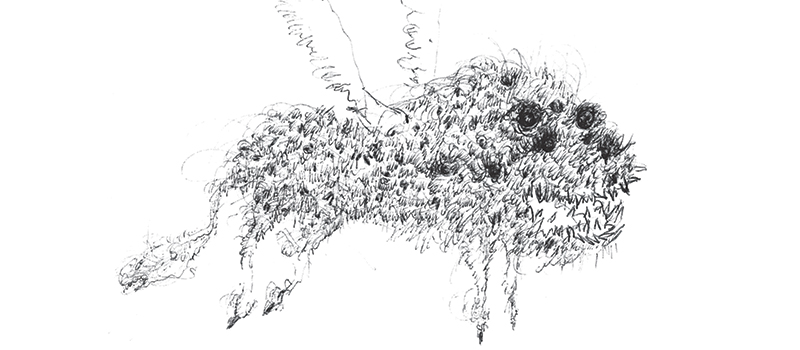Sabina Maselli’s spirited avant-film experimentation is the perfect introduction to tētēma, the Anthony Pateras/Mike Patton duo debuting tomorrow on Ipecac. Both, it should be noted, are mind-blowing.
Filmed in digital, transferred to film and bounced back again into the digital domain – just like Beckett wrote/translated from French to English to French again, Pateras notes – Maselli’s video for the single “Tenz” is a distorted tableau of the human body and the landscape it inhabits. We see rhythmically edited, rapid-fire images of opened and closed lime-green eyes, hands and feets in stark lighting, everything captured in the midst of a black hole, a colored pattern or the blurred light of a projector. Alcoholics Anonymous participants worship an alternately blank-screened or flickering TV, desolate trees pass us by, and people lay incapacitated on stage floors while Patton croons, “Even when immobile/ We are in motion.”
Nervy, to say the least.
And the music matches, a wondrous cacophony of ambient pastiche that seems to sit somewhere among aggressive, apocalyptic trip-hop, Patton’s pop-constructions with Peeping Tom, John Zorn-ish jazz cut-ups and the vocal and symphonic madness Patton captured nearly 15 years ago on his first Tzadik solo outings. In a word: genius. This is arguably Patton’s best and most realized work in years, and, if it stands up on future listening, it might make itself a nice home right up alongside the first two Fantomas records, Tomahawk, Mr. Bungle’s California and Faith No More’s Angel Dust. It is that good and a true return to goddamned hot form.
So, what makes this thing tick? There are bombastic, drum-throttled explosions-in-progress like “Pure War” (fitting title) and “Kid Has Got The Bomb,” where Patton curls down his collar and gets to the business of roaring and wailing. But those moments are set next to the borderline-tribal/borderline-Anonymous shuffle of “Irundi,” complete with a Patton ethnic falsetto, and “The Hell of Now,” which is covered in the textures of analog synths as much as it is the incredible (INCREDIBLE) rock phrasings of featured drummer Will Guthrie. (If this guy is the glue that binds the record, I want to huff more of it.) “3-2-1 Civilisation” pounds a furious groove. The closing “Death In Tangiers” and sections of “Emptiness of Ecstasy” are downright ominous – even more so than the opener, “Invocation of the Swarm” – and hit all the right notes, then some. The epic “Ten Years Tricked” would make Morricone smile.
It should be noted, quite incredulously in fact, that little to none of this is sampled and most of it straddles the analog/digital divide rather than setting up camp on one side of the chasm. Experimentalist Pateras laid down the tracks (all over the world) largely in the analog domain – you’ll hear real strings and hand-played instruments over the grind – and Patton is not looped ad-infinitum throughout. This is the real deal. Anyone who’s seen this guy work a board live while fronting one of his more “rock-oriented” efforts will believe the artistry and know it’s possible. The others? Well , what’s the wait to have him prove it?
In a lot of ways, the record echoes an obscure outing in which Patton was a participant shortly after the break-up of Faith No More in the mid-90s. Milk Cult’s Burn or Bury, like tētēma’s debut, flirted with jazz, rock and hip-hop, and used cut-up sound to achieve the goals of setting a distorted groove. (Patton lent some scatting and feral vocals to the album opener, “Psychoanalytwist,” a real gem.)
But Patton and Pateras aim and hit much, much higher on Geocidal, seeking to create a kind of high-octane polar opposite to the more pensive ambience of Kaada/Patton, another off-project affair. They don’t want to torture you. They want to seduce you with dark sound, and that has always been an arena where Patton knows (and works) best. With tētēma’s debut, the duo does that and then some, providing a nightmarish soundtrack that ranks among the best you’ll find from Ipecac this year. – Popdose, Dec. 8, 2014
-30-




